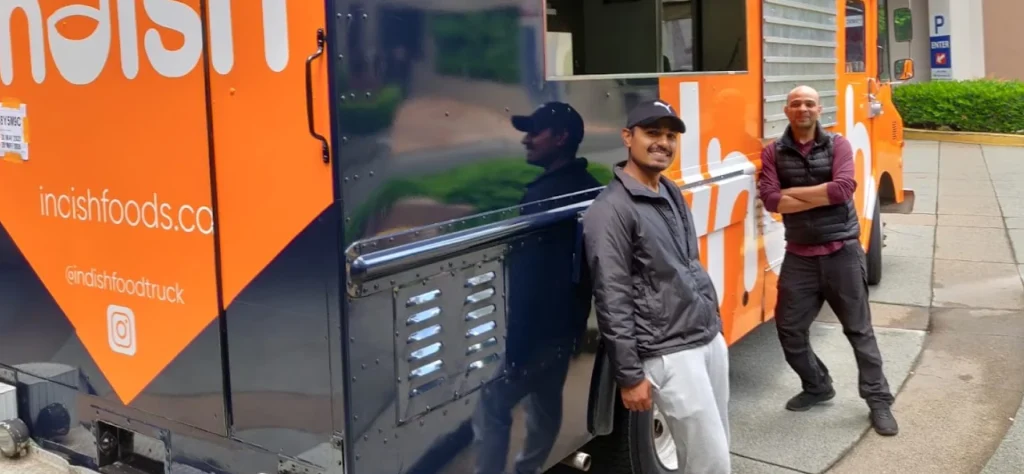Your business’s preparation for the busy seasons is unique to you. Still, you can learn a thing or two from asking mentors and peers in your network how they prepare.
Small Business BC connected with Anant Singh and Tushar Shroff, the co-founders of Indish, an Indian food truck in Metro Vancouver, to learn how they prepare for busy periods and succeed when the pressure is on.
Meet Indish
Ananat and Tushar are both immigrants who came to BC in 2019. After connecting through a mutual acquaintance, they decided to start a business together. At the start of 2020, they purchased the original Juice Truck’s old truck and started fixing it up for their new business. Then, the COVID-19 pandemic began.
“It was a bit of a challenging time for us, contemplating on starting the business at all,” Anant said. “Come June, we said, hey, let’s just hit the market and see what happens.” The pair had support from mentors and a loan from Futurepreneur, and their business grew slowly but steadily.
“What helped us in the beginning a lot was that our expectations were low, and we did our due diligence before we really got into it. Doing that and connecting with the customers, that’s what helped us initially figure it out and navigate the early COVID-19 days,” said Tushar.
For Indish’s co-founders, the early days were just about trying to make it work. They worked 16-hour days and did not pay themselves salaries to ensure they didn’t sink further, and they figured it out.
Today, their primary business comes from events, farmers markets, festivals, and more. As they grew their business, they leaned away from street sales because they are more unpredictable than events.

What Sets Indish Apart
Indish positions itself differently, representing Indian food well while at the same time challenging assumptions and traditions.
“The Indian market is pretty underrepresented,” said Tushar. “It’s still focused on a very specific regional style and way of serving, and we wanted to break that barrier when we entered the market.”
There are small differences in how they do things plus influences from how things are done in India. An example of a tradition is their use of mustard oil, a traditional Indian cooking staple. An example of how they’re doing things differently is using oat milk for their masala chai – even their customers from India don’t notice a difference.
“There’s a market for everything…We’ve found our place, and that’s why people who like our sauces come looking for us,” said Tushar.
Getting Ready for the Holidays and Busy Times
“Diwali and Holi are big for us, but our busiest season is actually the summer,” said Anant. “Canada Day is our busiest day,” said Tushar. “It’s one of the days where people don’t want to go to restaurants because they want to be out and about.”
While Indish is busy in the summer, two big Indian holidays in the off season (Diwali is in October and Holi is in March) give them a boost through more lean times.
“We’ve put a lot of time and effort into putting processes in place so that we’re not caught off guard,” said Anant.
Here’s a summary of some of Indish’s operational and planning strategies that they’ve learned over the years:
1. Planning
Indish will talk to other businesses who have set up at locations or events that they’re slated for to get an estimate of what the crowd and demand will be like and how much food they will need.
Before a big event, they start cooking sometimes days in advance to make enough. They also prepare themselves to restock multiple times a day. One time they ran out of food in the middle of the day and they vowed it would not happen again.
“The first year versus the fifth year looks very different…we know what sells most because of our track record and experience….we’ve had to put a lot of time just figuring out what made sense,” said Anant.
The pair learned to use data to make decisions rather than guessing what they’d need or preparing their menu in equal quantities.
2. Data-Driven Decisions
Indish uses the Square platform for sales, and it tracks what it sells by the hour and number of sales. These days, they don’t need to review the data too frequently. However, in the early days, it helped them determine how much to produce and how to staff the business.
“Now, we have a process where we know that if it’s 100 Butter Chicken, it’s going to be 50 of the other dishes – it’s like a proportion that we know is going to work,” said Tushar. “At the end of the day, it’s actually all about understanding the customer.”
3. Understanding Your Customers
Through trial and error, Indish learned the subtle differences in what customers enjoy in what setting. For example, demand at a corporate event will be different than a family event. At lunch hour near busy offices, people might be ordering salads, but on Canada Day, they will be ordering butter chicken poutine.
4. Staffing
The Indish team has two full-time staff and a handful of part-time staff, allowing them to scale up their labour according to demand.
5. Streamlining and Cutting Down Offerings
“One thing that definitely helped us was to make our menu as modular as possible,” At Indish, you might pick your base, your sauce, and your protein. This allows them to offer lots of different options to people without having to cook multiple dishes. They just assemble from what they have prepared. This also helps to reduce wastage.
When they know they are going to be slammed, they actually cut down their wider menu into fewer items, streamlining their processes even further.
The Future of Indish
“The Indian food market is still underserved, so there are opportunities to grow, and we are trying to figure out our next steps,” said Anant.
Having received support from mentors, they’re also eager to give back to the community through formal and informal mentorship.
There are always new food trucks hitting the market, and if they see someone heading towards a pitfall that they’ve been through before, they share the insight they’ve gleaned from their experiences.
You can learn more about Indish on their website and find out where they’ll be dishing out eats by following them on Instagram.
Small Business BC is Here to Help
SBBC is a non-profit resource centre for BC-based small businesses. Whatever your idea of success is, we’re here to provide holistic support and resources at every step of the journey. Check out our range of business webinars, on-demand E-Learning Education, our Talk to an Expert Advisories, or browse our business articles.
